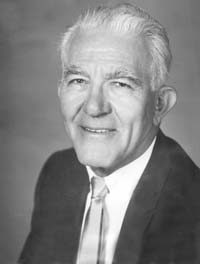
While I was taking classes in the Geography/Ecosystems program at UCLA, Autumn Quarter 1973, I was thinking about a career as an environmental lawyer. I knew it would be a very long haul. I wanted to take one last look at the possibility of a career as a drummer. I heard that the legendary master drum teacher Murray Spivack was teaching at a tiny office studio in the craft neighborhood of Hollywood . I went up there and took one lesson from the distinguished gentleman. After the lesson we discussed my career options.
—
PAS Hall of Fame
Murray Spivack
by Dave Black
The Percussive Arts Society mourns the loss of an old friend and Hall of Fame member, Murray Spivack. One of drumming’s most influential and highly respected teachers, Murray died on May 8, 1994, following a lengthy illness. He was 91.
Spivack, born in New York City in 1903, had two distinctly different professions – one, that of a professional theater and movie drummer/teacher, the other, that of an innovative sound technician. His early career in New York included stints with the orchestras at NBC, CBS and the Strand Theater. It was also at this time that he opened a percussion studio with Carl Glassman at the Gaiety Theater building.
In 1928, Murray was one of the first drummers to play for conductor Josiah Zuro, who, at the time, was synchronizing scores for silent pictures. In 1929, Murray moved to Hollywood, California where he managed the sound effects/music department at the RKO Studios. It was during this time that he devised all of the sound effects for the original King Kong motion picture. After King Kong was completed in 1933, Murray began teaching percussion again, but the film industry kept him from opening his own studio. He later went to work with Alfred Newman at 20 th Century Fox, where he remained for 17 years.
In 1995, he resigned from 20 th Century Fox to free-lance as a sound engineer. Among the many pictures he worked on were “Oklahoma,” “The Alamo,” “Westside Story,” “Sparticus,” “The Sound of Music,” “My Fair Lady,” “Cleopatra,” “Patton,” and “Hello Dolly,” for which we won a personal Academy Award.
But it is for his multi-decade career as a teacher that he is revered by literally thousands of drummers, including Louie Bellson, Remo Belli, David Garibaldi, William Kraft, Joe Morello and many other of today’s top drumming stars. For technique and hand development, Murray was the man to see. In 1972, after retiring from the film industry, he opened up his own teaching studio where he remained active until his death.
When asked to say a few words about Murray, two of his closest friends/students had this to say about him:
“Murray Spivack was an articulate gentleman who always believed in excellence. He was a great sound man for the Hollywood studios and was one of the most original of the drum teachers. He is responsible for most of my career as a drummer. And, last of all, we were devoted friends. I shall never forget him.” – Louie Bellson
“Murray Spivack’s contributions to the world of percussion didn’t necessarily happen only as a result of his teaching so many people who became very successful as professional musicians. His contributions to the field of recording percussion are legendary. And, his contribution to the whole subject of sound and how it is now promoted in motion pictures and television were enormous.
This individual found time in an extremely busy career to teach many interested drummers some profound technology in the playing of the drum. In having taught those who in turn taught others, he set a standard that will be very difficult to reach by the average person.” – Remo Belli
Murray Spivack was inducted into the Percussive Arts Society Hall of Fame in 1991 at the Anaheim PASIC. He will be missed by all of us.
This article was published in the November 1994 issue of Percussion News.
http://www.pas.org/about/hall-of-fame/murray-spivack
Working toward a shared planetary consciousness that heals the Earth


